

India Blockades Terminator Seeds. In what for now is a symbolic gesture, India has prohibited the import of seeds altered to produce sterile plants.
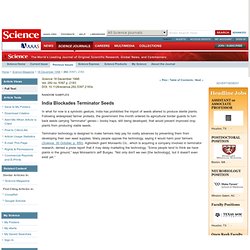
Following widespread farmer protests, the government this month ordered its agricultural border guards to turn back seeds carrying “terminator” genes— booby traps, still being developed, that would prevent improved crop plants from producing viable seeds. Terminator technology is designed to make farmers help pay for costly advances by preventing them from developing their own seed supplies. Many people oppose the technology, saying it would harm poor farmers (Science, 30 October, p. 850). Agbiotech giant Monsanto Co., which is acquiring a company involved in terminator research, denied a press report that it may delay marketing the technology.
“Some people tend to think we have plants in the ground,” says Monsanto's Jeff Burgau. 5 reasons to keep the world GM-free. Ethiopia: Terminator Technology / A seed of sterile thought (13/7/2006) 1.Ethiopia: Terminator Technology And Reasons to Go Organic 2.A Seed of Sterile Thought Two contrasting perspectives on Terminator.
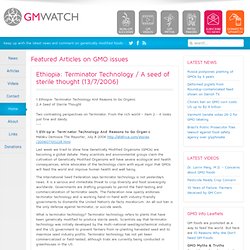
From the rich world - item 2 - it looks just fine and dandy. --- 1.Ethiopia: Terminator Technology And Reasons to Go Organic Melaku Demissie The Reporter, July 8 2006 Last week we tried to show how Genetically Modified Organisms (GMOs) are becoming a global debate. Home - Dropbox. How the Terminator Terminates.
How the Terminator terminates: an explanation for the non-scientist of a remarkable patent for killing second generation seeds of crop plants by Martha L.
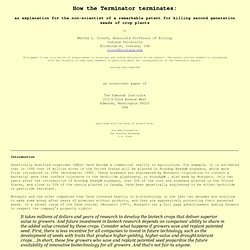
Crouch, Associate Professor of Biology Indiana University Bloomington, Indiana, USAcrouch@indiana.edu This paper is one in a series of essays meant to stimulate and inform discussion of the subject. An occasional paper of The Edmonds Institute 20319-92nd Avenue West Edmonds, Washington 98020 USA published with the help of grants from: The HKH Foundation The Funding Exchange C.S. Introduction Genetically modified organisms (GMOs) have become a commercial reality in agriculture. Monsanto and the other companies that have invested heavily in biotechnology in the last two decades are starting to make some money after years of promises without products, and they are aggressively protecting their patented seeds.
It takes millions of dollars and years of research to develop the biotech crops that deliver superior value to growers. Terminatorposter. Mechanism behind Terminator Gene Technology15.5.2012. Genetically Modified Foods: Breeding Uncertainty. Is Monsanto Going to Develop or Sell "Terminator" Seeds? Myth: Monsanto sells “Terminator” seeds.
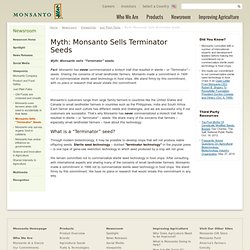
Fact: Monsanto has never commercialized a biotech trait that resulted in sterile – or “Terminator” – seeds. Sharing the concerns of small landholder farmers, Monsanto made a commitment in 1999 not to commercialize sterile seed technology in food crops. We stand firmly by this commitment, with no plans or research that would violate this commitment. Monsanto’s customers range from large family farmers in countries like the United States and Canada to small landholder farmers in countries such as the Philippines, India and South Africa. Each farmer and each culture has different needs and challenges, and we are successful only if our customers are successful. What is a “Terminator” seed? Through modern biotechnology, it may be possible to develop crops that will not produce viable offspring seeds. Ban Terminator - Ban Terminator. Genetic_Use_Restriction_Technologies_20030611_(En) Seeds: Terminator seeds.
SPONGES FROM. Although farmers in the developing countries would like to use their own harvested seeds for replantation, despite the provisions of Article 27.3(b) of the Trade-Related Aspects of Intellectual Property Rights (TRIPS) Chapter of World Trade Agreement and those of the 1991 Act of Union International Pour la Protection des Obtentions Vegetables (UPOV), the multinational seed companies (MNCs) would like these farmers to buy seeds for each sowing, so that they may get fair return for the heavy investments they make in developing improved crop varieties.
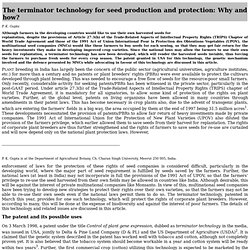
Since the national laws may allow the farmers to use their own seeds for replantation, a terminator technology has now been developed, which will render the harvested seeds inviable, thus forcing the farmers to purchase fresh seeds for every crop season. The patent granted in USA for this technology, the genetic mechanism involved and the defence presented by MNCs while advocating in favour of this technology are discussed in this article. What is Terminator technology? Terminator technology is the genetic modification of plants to make them produce sterile seeds.

They are also known as suicide seeds. Terminator's official name - used by the UN and scientists - is Genetic Use Restriction Technologies (GURTs). Although Terminator seeds are not yet being sold, in 2007 biotech companies with the support of the US Department for Agriculture were conducting greenhouse tests for future commercialisation. Good for biotech companies, bad for farmers Terminator spells trouble for peasant farmers throughout the developing world because they would no longer be able to save seeds to re-use from one harvest to the next. Why is it being developed? Terminator Gene - An Academic & Technological Inquiry - Germination Termination. Bibliography & Literary Review 1.
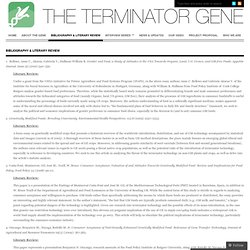
Bellows, Anne C., Alcaraz, Gabriela V., Hallman William K. Gender and Food, a Study of Attitudes in the USA Towards Organic, Local, U.S. Grown, and GM-free Foods. Appetite Journal. Literary Review: Under a grant from the USDA Initiative for Future Agriculture and Food Systems Program (IFAFS), in the above essay authors Anne C.